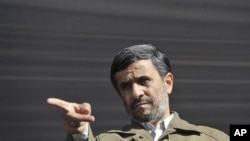The United States, Britain and France expressed their continued concern about Iran's suspect nuclear program Friday, saying Tehran persists in disregarding its international obligations to answer questions about the nature of its program and to stop enriching uranium.
Just days after world powers met in Geneva with Iran to restart talks about its nuclear program, the U.N. Security Council committee tasked with monitoring the implementation and compliance with international sanctions on Iran reported two violations in the past three months.
The first occurred in Italy in late September, when authorities seized seven tons of the powerful explosive RDX which was being shipped from Iran and destined for Syria. The second occurred in October, when Nigerian authorities seized 13 shipping containers of illegal arms reportedly originating from Iran. The destination of those weapons has not been clarified.
French Deputy U.N. Ambassador Martin Briens highlighted international concerns about the flow of such illegal weapons and explosives in violation of Security Council resolutions. He is heard here through a translator:
"Therefore there is a considerable flow of arms and other dangerous material which has once again come to light - with itineraries between the port of Bandar Abbas [Iran] and Latakiya [Syria] in particular," said Briens. "And there are new worrying routes that have been identified in Africa too. Once again, this is only the tip of iceberg that has come to the fore."
U.S. Ambassador Susan Rice said the recent report of the International Atomic Energy Agency also underscores Iran's continued defiance of its international obligations and shows that Iran has yet to take meaningful steps required by the Security Council and called for by the IAEA Board of Governors.
"Most notably, the report underscores Iran's ongoing uranium enrichment at 3.5 percent and near 20-percent levels," said Rice. "The report also details Iran's continued construction of a heavy-water research reactor, its refusal to permit the IAEA the access it needs to answer longstanding questions about the Qom enrichment facility, and its non-response to the questions around a possible military dimension to Iran's nuclear program."
British Ambassador Mark Lyall Grant said that for the dual track of pressure and engagement to work, rigorous implementation of the sanctions is essential, especially as the most recent violations are part of a pattern of breeches of relevant U.N. resolutions.
The international community has expressed concerns that Iran's nuclear pursuits are for military purposes, but Tehran insists they are only seeking nuclear energy for peaceful purposes.
The five permanent members of the Security Council plus Germany and the European Union met with Iran earlier this week for two days of talks in Geneva about its nuclear program. The parties have agreed to continue the discussion next month in Istanbul.
Western Powers say Iran Continues to Flout UN Sanctions Resolutions




